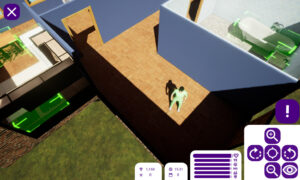Statistics indicate that nearly 10 million people in the European Union are living with the severe consequences of a stroke. It is a condition that usually leaves the patient disabled, often requiring constant care. Rytis Maskeliūnas, a researcher at KTU’s Faculty of Informatics, Lithuania together with an international team, have developed an app that will teach how to take care of a person who has suffered a stroke in a virtual environment.

A stroke is a devastating experience. Coming back home from the hospital, is a second shock since the condition affects not only the stroke victim’s life but also the lives of the family. According to Maskeliūnas, a researcher at the Department of Multimedia Engineering at Kaunas University of Technology (KTU), Lithuania, it is difficult to survive such a change without help.
“iTrain” is an interactive training course designed to support post-stroke care. It consists of a combination of different tools – a brochure, an interactive Massive Open Online Course (MOOC), visual material, and a serious game, which is becoming an increasingly popular form of training.
Many of us have a superficial knowledge of stroke and have been exposed to the disease in our environment in one way or another. However, according to Maskeliūnas, superficial knowledge remains so until life forces us to get to know the problem in more depth. The “iTrain” interactive training package aims to fill this gap.
According to the KTU researcher, the “iTrain” learning tool is both a game and a training programme. It is up to the user to decide which will be more effective.
“The learning takes place in an easy, quick-to-follow mode, somewhat similar to the very popular “EA SIMS” game,” says Maskeliūnas.

The “iTrain” game teaches exemplary nursing practice, how to create a safe home environment, allows users to try outpatient care in a virtual environment, and teaches other aspects essential for post-stroke care. How does it work? Clicking on an object or scenario tests the player’s knowledge – he or she has to choose the optimal option that determines the quality of life of the person being cared for. The situation is constantly changing, as the quality of life is affected by a variety of factors ranging from the very basic ones, such as a person’s need to eat and sleep, to his or her psychological state. All these situations are simulated in the game.
According to the researcher, this form of training is attractive not only for the younger generation; for many, an interactive game is a more enjoyable and less time-consuming activity than reading a brochure or spending several hours on a course.
“Professional medical expertise and real-life evidence gathered during the “iTrain” project have been used for the game’s methodology,” says the researcher.
Medical professionals from Italy, Cyprus, and Sweden interacted with stroke survivors, their families, and professionals in the field. These interviews, complemented by medical practice, formed the basis for the training material on which the game was developed.
“To our knowledge, there are no serious games that teach about stroke care. Even in nursing, it is a rather broad niche, where one of the pioneers was our game, introducing dementia in old age”, says Maskeliūnas.

Although some patients can live a fulfilling life after rehabilitation – depending on the severity of the stroke and other factors – it is not uncommon for stroke survivors to have their lives changed radically.
According to Maskeliūnas, a researcher at KTU, depression is quite common among people who have had a stroke: “The person realises that his or her life has changed, usually irreversibly.”
Many families do not have the financial means to use the services of a nursing home, so they care for the patient at home, which also disrupts the daily routine of the household: “It is morally difficult to watch a loved one suffer, and the care is time-consuming (with special food, hygiene, exercise, communication) so that there is no time left for oneself.”
For these reasons, depression can also occur in the relatives of patients, whose lives are also changing radically. To investigate the impact of “iTrain” on the course of depression, which can be caused by the burden on carers, researchers used the Geriatric Depression Scale (GDS).
According to Maskeliūnas, the results of the study showed that the “iTrain” game had a significant positive effect on the change in anxiety among carers and stroke victims.
The “iTrain” game is available on Google Play and Apple App Store.
The original study described above can be accessed here: https://doi.org/10.3390/info13120564